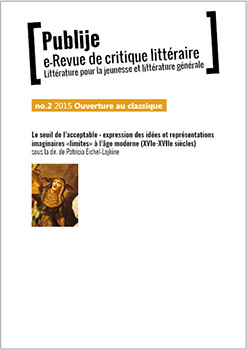Straparola dicing with sauciness
Mots-clés :
Sixteenth century, Straparola, Le Piacevoli Notti, The Facetious Nights, Louveau, Larivey, translation, (re)edition, reception, indecency, shamelesness, (fairy) tales, churchmen, laughter, obscenity as a comic element, scatological humorRésumé
This papers deals with the limits of acceptability in the reception of Straparola’s Facetious Nights. At first, it demonstrates that, in the 1550s, censoreship began to react to obscene or erotic elements which were not a problem in themselves unless churchmen were involved in the stories. It highlights the peculiar way in which Larivey’s translation imports in the French Straparole some of the content that had been censored in Italy by the Counter-Reformation. Secondly, the issue of acceptability is discussed using another method : « Adamantina »’s story (novela V, 2, translated in French by both Louveau and Larivey) mixes marvellous and indecent motives and it leads to an analysis evaluating the symbolic and critical aspects of this fairy tale.
Téléchargements
Publiée
Comment citer
Numéro
Rubrique
Licence
Les auteurs qui publient dans cette e-revue acceptent les termes suivants :
Les auteurs conservent le droit d'auteur et accordent à la revue le droit de première publication, sous la licence Licence d’attribution Creative Commons permettant à d'autres de partager les articles tout en en reconnaissant la paternité et la publication initiale dans cette revue.





